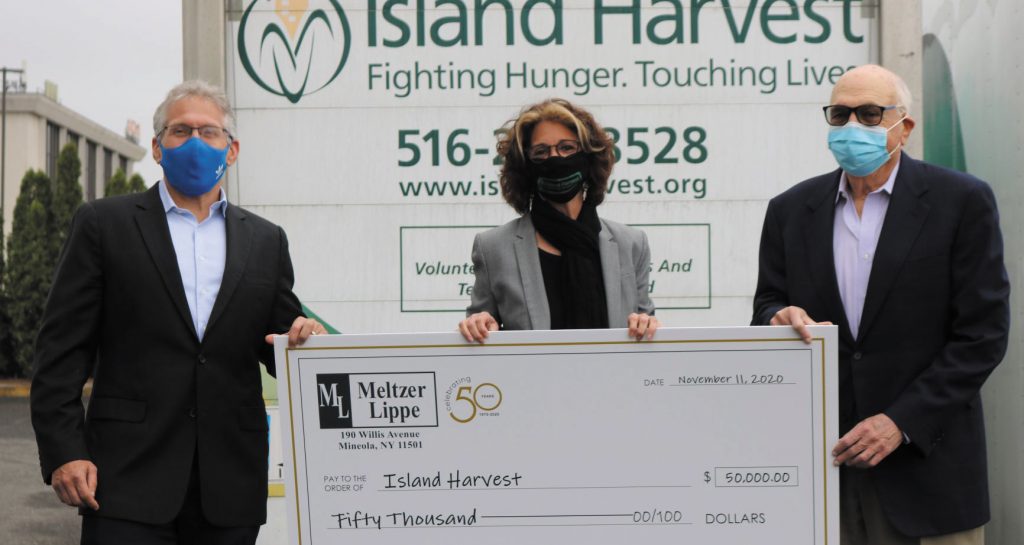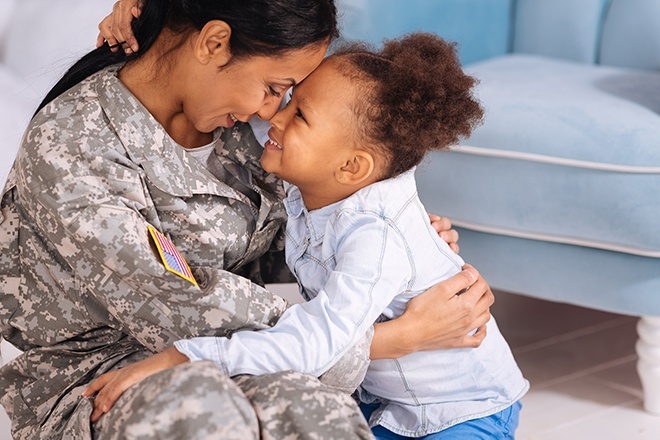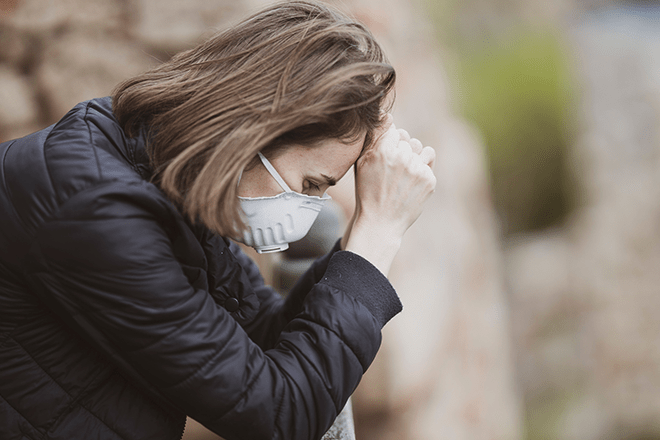Corporate giving is making life a little easier for some of the Long Islanders struggling to make ends meet in the time of COVID-19.
And amid the pandemic, whose earlier shutdown triggered economic fallout across the region and around the country, the need is great.
Just ask Randi Shubin Dresner, the president and CEO of Island Harvest Food Bank, which helps feed the food insecure on Long Island.
“Normally we help 300,000 families a year, but from the end of March to June, we helped 300,000 families,” she said.
This year, Island Harvest increased its food purchases by 500 percent, she said.
Thankfully, some corporate donors and individuals are stepping up.
Take the Mineola-based law firm Meltzer, Lippe, Goldstein and Breitstone. The firm was gearing up pre-COVID to celebrate its 50th anniversary and wanted to meaningfully mark the occasion.
“Our plans, like so many others, were derailed by the pandemic,” said David Heymann, the firm’s managing partner.
“Accepting the fact that our big day could not happen in 2020, we determined to find some meaningful action we could take to ‘do good’ in recognition of 50 years of legal service and advice to the community,” he said. “We came to the conclusion that with all the stress and suffering, a virtual bash was not appropriate, and our funds could be put to better use, benefitting our less fortunate neighbors. We are extremely proud to have partnered with Island Harvest and the good works that they do.”
The firm’s initiative comes at a time when donors have stepped up their philanthropic giving amid the pandemic. Twenty-five percent of the philanthropic individuals surveyed in a 2020 poll expected to increase their donations, while 54 percent said they would maintain their giving levels, according to Fidelity Charitable, an independent public charity that helps donors support nonprofit organizations. But nearly half of those surveyed expected they would decrease or stop volunteering because of the pandemic. Conducted by the independent research firm Artemis Strategy Group, the survey heard from 1,842 adults earlier this year in the United States.
Dresner said that when Lew Meltzer, the Meltzer, Lippe chairman, toured the Island Harvest facility, he hoped his donation would challenge other law firms to donate as well.
Meanwhile, North Shore Child and Family Guidance Center in Roslyn Heights is also benefitting from generous philanthropy. Its board member Andrew Marcell, the CEO at Aon Reinsurance Solutions, spearheaded a private, socially distanced golf event, and his company raised over $56,000 for the nonprofit.
“This money provides crucial funding for our mental health services for kids and families throughout Nassau County, especially important during the pandemic, when the need is so great,” Andrew Malekoff, North Shore Child and Family Guidance Center’s executive director and CEO, said.
And Family & Children’s Association, one of the largest and oldest health and human service agencies on Long Island, is a beneficiary of Hassett Subaru’s Share the Love Campaign, giving the organization a boost in delivering services.
Still, COVID-19 has cut into the organization’s ability to fundraise.
“I know that there are Long Island charities that are getting a record number of donations, but here at FCA, we haven’t had exactly the same experience,” said Jeffrey Reynolds, FCA’s chief executive.
“Our loyal donors have been supportive, but without events, with everyone complaining about email overload and our staff heavily focused on serving people in need – especially in our programs for homeless teens and services for people with mental health issues – we will likely end the year having to make some program cuts,” Reynolds said.
But that won’t diminish the need for services.
“Government contracts are being cut by 20 percent,” Reynolds said. “We are spending lots of money on PPE and cleaning supplies and our clients are asking for more and more help. That’s a perfect storm and we are making sure to re-double our holiday appeal efforts so that we can maintain programs, avoid waiting lists for services and keep staff in place for the new year. It’s daunting for sure, but I have a lot of confidence that Long Islanders will come through as they always do.”
Already at Island Harvest, organizations are stepping up in time for the holidays.
Bethpage Federal Credit Union, for instance, is launching its contactless Turkey Drive on Nov. 20 at its headquarters so that Long Islanders facing food insecurity can enjoy Thanksgiving.
“When COVID first hit earlier in the year, Bethpage Federal Credit Union immediately dedicated a significant amount of its financial resources to support COVID-specific relief efforts in addition to our normal community giving plans,” said Linda Armyn, Bethpage Federal’s senior vice president of corporate affairs.
The credit union provided “a substantial amount of funding to support healthcare workers, emergency daycare programs, COVID research, hunger relief and seniors, as well as families who became financially stressed through loss of income,” she said.
Wells Fargo funded meals for 1,500 families over six weeks in Hempstead, Dresner said.
Stop and Shop, too, has been “an incredible resource” year-round for Island Harvest. About 10 years ago, Island Harvest brought an idea to cut down waste by donating instead of throwing away meats that neared its sell-by date. The meat is now frozen and distributed to agencies and partners that safely handle frozen food.
Dresner is also active in the Long Island Food Council, where a member company, La Flor, donates spice packets during the holidays. “If you’re struggling to put food out for the family, the last thing you’re going to buy is spice,” Dresner said.
The $50,000 donation from Melter Lippe will provide nutritional education material for thousands of turkeys, so when people bring the poultry home, they understand how to cook it properly according to food safety guidelines.
The money will also go towards marketing efforts to let “others know about the important work we are doing through food donations and monetary support,” Dresner said.
Their generosity may well prompt others to help more Long Islanders persevere through the pandemic.





